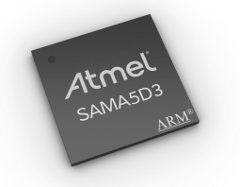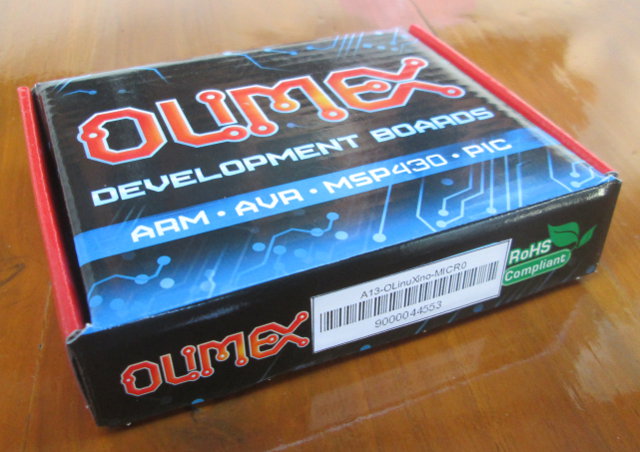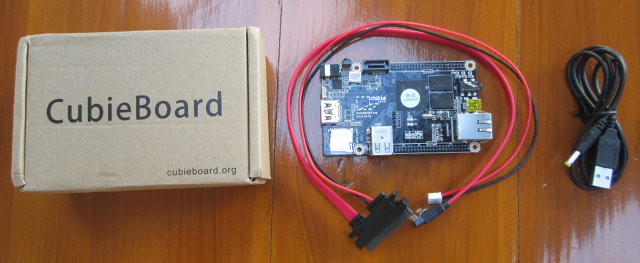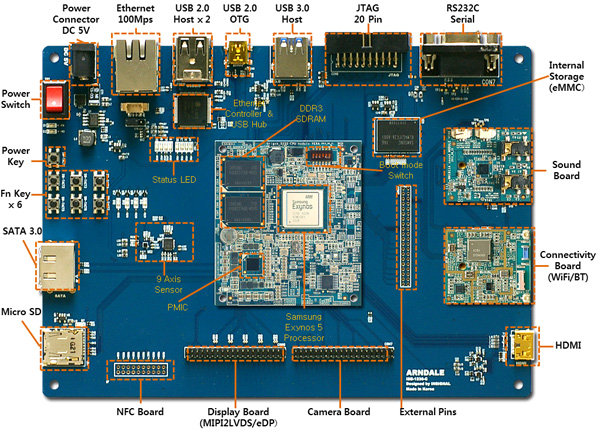Last week, I explained how to build U-boot, the kernel, and Android for Freescale i.MX6 HDMI dongle reference platform. Since them, there has been a bit more activity, with Richtechie releasing source code to some ARMTvTech members. However, this source code is very similar to the one released by Freescale, and misses some part present in the kernel config on GK802 such as CONFIG_MACH_MX6Q_RICHTECHIE, and the company clearly does not comply with the GPL. Let’s forget that for now, as Jasbir (who is also behind the Hackberry board) has managed to build and boot the kernel on his mini PC. There’s still more work to do, but at least we have a based to work on. In the meantime, I’ve noticed rz2k, an other developer, was also giving it a try on #arm-netbook Freenode IRC channel, so we decided to setup a few things to facilitate development and communication between developers. […]
Atmel Introduces SAMA5D3 Cortex A5 Embedded MPUs and Evaluation Kits
Atmel has recently announced the Atmel SAMA5D3 series, a family of high performance, low-power microprocessor units (MPUs) based on ARM Cortex-A5 core. The SAMA5D3 series is designed for embedded applications in the industrial space, including factory and building automation, smart grid, medical and handheld terminals, as well as consumer applications such as smart watches, outdoor GPS, and DECT phones. SAMA5D3 family has the following characteristics: ARM Cortex-A5 core up to 536MHz (850DMIPS). Floating point unit (FPU) with up to 3 times the performance of Cortex A8 FPU. 166MHz bus speed delivering up to 1328MB/s bandwidth. Power consumption: <200mW in active mode at 536MHz with all peripherals activated 0.5mW in low-power mode with SRAM, registers retention and <0.5ms wake-up time ~1.2µA in backup mode with RTC running Connectivity: Dual Ethernet and dual CAN ports (Only one model has both) Gigabit Ethernet MAC with IEEE1588 and 10/100 MAC Two CAN controllers 3x […]
Barebox Bootloader Status Update – ELCE 2012
Sascha Hauer, kernel developer at Pengutronix, gives an update about the status of Barebox bootloader at the Embedded Linux Conference 2012 in Barcelona, Spain. Abstract: Booting Linux is still a hot topic on embedded systems. It has been 3 years since the last presentation about Barebox at ELC-E, and the barebox community has grown and developed many new and unique features during that time. The talk gives an update on the status of barebox, including MMU support, compressed images, menu system, automouter, tftp, nfs filesystem, USB updating techniques and other goodies. The presentation is for kernel porters who need a robust, flexible,extensible and well structured tool to bring up Linux on embedded hardware. It is equally suitable for new and experienced barebox users. Agenda of the talk: Tour through Barebox – Basic hardware initialization (SDRAM, clocks), Startup, User Interface, Start operating system, Update and Initial hardware bring-up. Devicetree support Multi-platform […]
Olimex A13-OLinuXino-MICRO Development Board Unboxing And Review
Every Friday, Olimex organizes an online competition where they give away one of their board. They’ll ask a (usually simple) technical question on their twitter account at 22h00 (GMT+7), and all you have to do is to reply to their tweet with the correct answer within one hour. The winner is then selected randomly with random.org. There are usually 50 to 100 respondents so the odds are pretty good. I played a few times, and finally, I was lucky enough to win an A13-OLinuXino-MICRO development board at the beginning of December. I received it yesterday, after UPS took a whooping 15 days to deliver the board (Way to go UPS!). The board can be purchased on Olimex for 35 Euros plus shipping and taxes, or even lower if you order larger quantities. A13-OLinuXino-MICRO is a stripped down version of A13-OLinuXino-WIFI with the following specs: SoC – AllWinner A13 Cortex A8 […]
Linaro 12.12 Release with Linux Kernel 3.7 and Android 4.2.1
Linaro release 12.12 has just been announced, and includes Linux Kernel 3.7 and Android 4.2.1. The tracking version (stable release) uses Kernel 3.4.22. This release upgrades Android to version 4.2.1, Ubuntu images are now based on Ubuntu 12.10 (Quantal Quetzal) and Linaro U-Boot 2012.12 has been released with support for Origen 4 Quad and Arndale boards. Further improvements have been done for OpenEmbedded ARMv8, where they replaced the php Apache module by php-fpm among other things. On the kernel side, USB drivers have been refactored, and a kernel size analysis have been performed on several platforms. The power management team has mainly worked on big.LITTLE IKS and MP implementations, and it’s the first time LEG (Linaro Enterprise Group) is included in the release, and they worked on UEFI for ARM, GRUB for U-Boot, and provided a Ubuntu server image for Arndale board which can boot via UEFI or UBoot. Here […]
Cubieboard Unboxing and Quick Start Guide
I’ve received another cool board this week with the Cubieboard development board. As a quick reminder, the Cubieboard is the only proper low cost AllWinner A10 development board available, and comes with 512MB/1GB RAM, 4GB NAND Flash, 10/100 MBit Ethernet, HDMI output, 2x USB Host port, 1x USB OTG port, a microSD socket, a SATA interface, an IR sensor and 2 headers to access extra pins such as GPIOs, I2C, SPI,VGA pins, CVBS pins etc… CubieTech had a successful Indiegogo campaign where the 1GB board was available for $59 including worldwide shipping (and as low as $19 for early birds), and you can now buy it from resellers. [Update: It’s now available with several cables, USB to TTL debug board, and an enclosure for $80 on dx.com] Cubieboard Unboxing The board comes with a SATA cable and a USB cable for power. There’s no power supply so you’ll need you […]
AMLogic Releases U-Boot and Updated Linux Kernel Source Code
AMLogic released kernel 3.0.8 source code for AML8726-MX a few months ago, and yesterday they provided an updated tarballs with the kernel, and for the first time, AFAIK, released the source code for U-Boot. There are 4 new files apparently generated from the (internal) git repository in AMLogic: common-2012-11-20-git-b687495906.tar.gz (108M) – This is the same kernel 3.0.8 release has last time, but with updated code. m1-kernel-android-2012-11-20-git-5d0f6b8e93.tar.gz (103M) – This looks like an older kernel 2.6 for AML8726-M1 only. uboot-master-2012-11-20-git-9b50e9a295.tar.gz (16M) – U-Boot 2010.06 possibly to use with the older 2.6 kernel. Only for M1 & M3 platforms. uboot-next-2012-11-20-git-b0e532795a.tar.gz (40M) – U-Boot 2011.03 for use with M3 and M6 platforms. I’ve already explained how to build the kernel in the previous post, so I’ll focus on U-Boot this time. Ubuntu 12.04 arm-linux-gnueabi- toolchain fails to build U-Boot (uboot-next), so you’ll have to install Sourcery toolchain instead: wget http://openlinux.amlogic.com/download/linux/ARM/gnutools/arm-2010q1-188-arm-none-eabi-i686-pc-linux-gnu.tar.bz2 tar xjvf arm-2010q1-188-arm-none-eabi-i686-pc-linux-gnu.tar.bz2 […]
$249 Samsung Exynos 5 (Cortex A15) Arndale Development Board
Samsung has announced the first Cortex A15 development board available for purchase. Like the Origen board, Arndale development board has been designed by InSignal and features a dual core Exynos 5 (5250) cortex A15 processor @ 1.7 GHz, 2 GB RAM, internal storage via eMMC and plenty of ports. The development kit is composed of a CPU module (Exynos 5 , RAM and PMC) and a baseboard. Here are Arndale development board specifications: CPU Board Exynos 5 [email protected] GHz dual core 2GB 32-bit 800 MHz LPDDR3/LPDDR2 Base Board Sensors Accelerator : Invensence MPU-6050 Gyro : Invensence MPU-6050 e-Compass : AKM -AK8963C Camera Interfaces: ITU 601, MIPI CSI Video Ouput: HDMI 1.4 interface (micro HDMI) 1 channel eDP output Single WQXGA MIPI DSI interface USB: 1x USB3.0 Host 2x USB2.0 Host 1x USB 2.0 OTG SATA 1.0/2.0/3.0 interface 1 channel eMMC 4.5 1 channel SDIO 3.0 2 channel SD 2.0 (microSD slot) 4 channel […]








